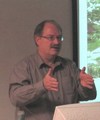WATERMARK MAGAZINE (cover story in Summer 2015 issue): Asset Management for Sustainable Service Delivery: Supporting the Vision for Integration of Natural Systems Thinking into “The BC Framework”

“Coined in 2010, the term Sustainable Service Delivery was introduced by the Province to integrate financial accountability, infrastructure sustainability and service delivery. While the BC Framework was only launched in early 2015, it has garnered both national and international attention. Other provinces, as well as the Federation of Canadian Municipalities, are integrating the BC Framework into their respective work,” wrote Glen Brown.










